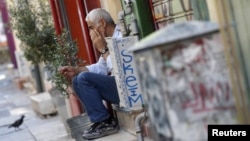In a middle-class Athens neighborhood full of boarded-up storefronts, customers lined up at the Rizos Bakery on Monday to inhale the lovely smells of fresh bread and emerge with loaves still warm from the ovens. Co-owner Alexandros Rizos stood behind the counter and worried whether he would have to lay off workers, or whether his 15-year-old business might go under.
Greece secured a third bailout Monday that averts financial catastrophe but hits some of its already struggling citizens hard.
Rizos, 36, who owns the small bakery with his brother, said the deal serves up a double blow: Greece's sales tax on food looks likely to rise from 13 percent to 23 percent — meaning he'll have to raise prices for already struggling customers — and the deal liberalizes laws to let many more businesses open on Sunday, something that favors big chain stores because many small businesses like Rizos' can't afford to open seven days a week.
"They're calling this bailout the third package of help for Greece, but I could get hit at least two ways," Rizos said. "I don't know if my customers will still buy here or end up going somewhere else."
Around Greece, the elderly worried about what Greece's agreement to reform its pension system might mean for them.
Roza Alverti, 83, hoped the package won't reduce the 900 euros ($994) she gets each month to support herself and two grown grandchildren living with her. The retired apartment building concierge said she's just getting by, and was so afraid of the changes that she stopped watching television this weekend while Greece negotiated with its creditors.
"My pension's low, so I hope they don't cut it," she said.
There was worry too in the hotels that bring in key tourism dollars — and where sales tax will rise from 6.5 percent to 13 percent — and in restaurants, where the 23 percent food tax will apply.
"If the government takes our profits like this, we could lose everything," Mary Cromba, 49, said as she sat at the cash register in her unusually empty Cap D'Oro seafood restaurant on the pebbly Psatha beach, where Athenians take day trips for the turquoise waters and pine-covered mountains.
She speculated that some restaurant owners will likely respond by ignoring the tax altogether, leaving sales tax off the bill for cash-only transactions and not reporting the transaction.
"That way they don't have to pay the tax for the business or for the customer," she said. "It's good for both sides."
Utility company office worker Alexandros Logothetis said he is "furious" that working-class and middle-class Greeks will end up bearing the brunt of the tax increases.
"Regular people will pay more, not the big fishes like the media tycoons and the shipping magnates," said Logothetis, 58. "I wanted a deal where the rich people would pay off our debt."
About the only consolation, Logothetis said, is that things could have been even more dire had Greece been forced to leave the euro.
"It would be worse," he said, "if the drachma returned."




